#Berliner Weisse
Explore tagged Tumblr posts
Note
Hello! Regarding your very recent post about St Patrick's Day Beer: Himbeersirup is indeed Raspberry syrup, not strawberry as you've stated. Also, Berliner Weisse without syrup can be quite refreshing on a hot day when served cold, it has a lower alcohol content of about 2.5 vol % if I remember correctly and is indeed pretty sour on its own. I prefer it with the Waldmeistersirup, which is probably impossible to get anywhere else but it Germany. It is *very* artificial in flavour AND colour. Anyways, I hope you and your wife have a wonderful Sunday evening!
(also to @schimmelspore)
I finished that post and the long one about coddle at about 4:30AM, then went to bed - and woke up at 6AM thinking Erdbeer oder Himbeer, Himbeer oder Erdbeer? which was very odd since Ich sprech nur die Turist- u. Speisekartedeutsch Dialekte.
I didn't bother fixing it (6AM after all) though with the Heinzelmännchen on the job, I should have done!
(It's fixed now!)
Markus did mention about Berliner Weisse's sourness and low alcohol strength - prompted maybe because I was just then tasting Fürst Bismarck for the first (furst?) time... :-> and also told us that the bottled versions of Weisse were very "soft-drink" in look and taste.
(DD suggested it was like an "Alco-pop" and he agreed, I suggested it might taste like a Belgian Frambozen and he said a bit, but far weaker).
He recommended that when we finally got the chance to try it in a Berlin Kneipe we should order draft, and also (not just because we were Irish) that the green version was best.
That was when someone else in the con bar chipped in with a Three-X-Go-Into-A-Bar Joke which you probably know.
Three Germans go into a bar. One's from Berlin, one's from Cologne and one's from Munich. The Berliner orders a Berliner Weisse, the Kölner orders a Kölsch and the Münchener orders a mineral water. The other two ask why, and the Münchener says "Well, since you're not drinking beer I shouldn't either..."
Reinheitsgebot or not, regional beer is serious business in Germany - and seriously regional too, which is why I've yet to find and try a Roggenbier or a Gose.
More for the bucket (or appropriately-shaped glass) list!
22 notes
·
View notes
Text

8 notes
·
View notes
Text
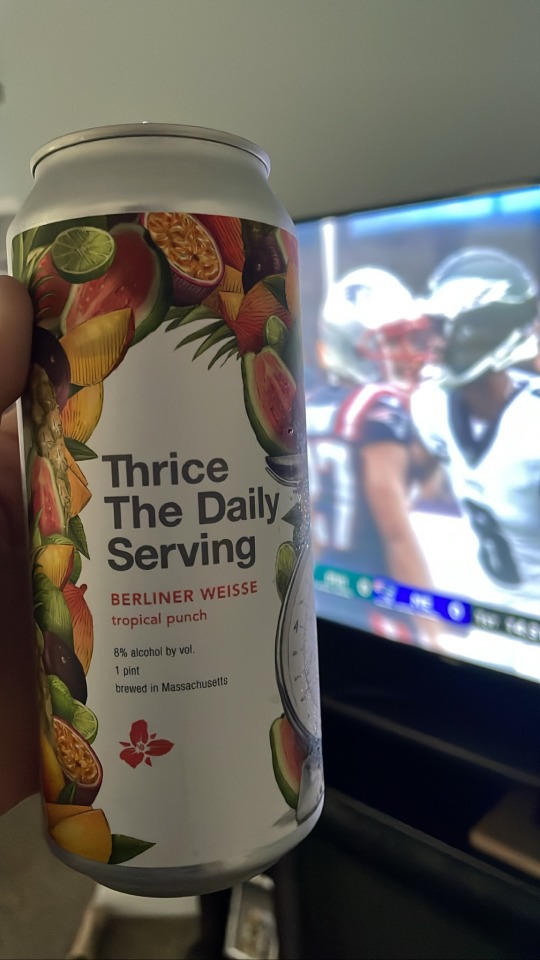
First official football Sunday of the szn🍻
Pats are gonna put me in an early grave
#personal#mine#football#NFL#daily serving#New England#New England beer#sour#Berliner weisse#trillium#thrice daily serving#fruity#yum#patriots#eagles
11 notes
·
View notes
Photo



(via German Berliner Weisse Beer Tote Bag by bestawesome)
1 note
·
View note
Text

U-Bahnhof Rohrdamm 13629 Berlin
51 notes
·
View notes
Text
pimple
pimole remedies

#I think rolli juju julio whatever accidently gave her his little things instead lmao#hallo aus berlin#rolli und rita#halloausberlin#rolliundrita#was ist dein lieblingsfach#drawing#rita weiss#rita weiß#rita hallo aus berlin
7 notes
·
View notes
Text




rising from my tumblr grave for her <3
#tatort berlin#corinna harfouch#ich weiss nobody cares for her in the tatort fandom but she is MOTHER#tatort tag
22 notes
·
View notes
Text

21 notes
·
View notes
Text
Judd Legum at Popular Information:
In 2020, Bari Weiss quit her job as an editor and writer at the New York Times editorial page in a huff. In her public resignation letter, Weiss argued that she was forced out because the paper had become "illiberal" and her more conservative beliefs made her "the subject of constant bullying by colleagues."
In January 2021, Weiss launched a newsletter, Common Sense, with her partner, Nellie Bowles. Weiss billed Common Sense as the antidote to "cancel culture," which she argued was the practice by progressives of seeking to punish and ostracize anyone who diverged from their ideological orthodoxy. "The fact that cancellation tales have become an everyday feature of American life should do nothing to diminish how shocking they are, and how damaging they are to a free society," Weiss wrote in October 2021. "Everyone… of conscience needs to start saying no to the mob." Whether or not Weiss' core critique is true, it is lucrative. In 2022, Common Sense rebranded itself as The Free Press to reflect its growing ambitions. It now reportedly employs about 30 people and generates millions in revenue annually. The rebranded publication continues to rail against "cancel culture." Bowles recently published an excerpt from her new book in The Free Press in which she describes the "pleasure" she used to get from helping "cancel people" — before she saw the light and embraced intellectual freedom.
Ironically, as Weiss cashes in on her critique of "cancel culture," The Free Press has become a central part of a sophisticated right-wing ecosystem that seeks to tear down anything and anyone who diverges too far from their ideology. The latest effort began on April 9, 2024, when NPR editor Uri Berliner wrote in The Free Press that his employer had "lost America's trust." Using a formula that is typical for The Free Press, Berliner describes himself as fitting the liberal mold — admitting that he was "raised by a lesbian peace activist mother" and "eagerly voted against Trump twice." But Berliner says that NPR has gone too far. NPR, according to Berliner, has abandoned its "open-minded spirit" and is too focused on catering to the left.
One of the core pieces of evidence Berliner cited was NPR's coverage of allegations that the "Trump campaign colluded with Russia." Berliner said NPR "hitched our wagon to Trump’s most visible antagonist, Representative Adam Schiff." He complained that Schiff was interviewed 25 times and, during those interviews, "alluded to purported evidence of collusion." But an NPR spokesperson told Washington Post media critic Erik Wemple that between January 2017 and December 2019, NPR conducted 900 interviews with congressional lawmakers, including stalwart conservatives like Jim Jordan (R-OH) and Paul Ryan (R-WI). In other words, Schiff did not dominate the coverage. Overall, Wemple describes Berliner's critique of NPR's Russia coverage as a "lazy… feelings-based critique of the sort that passes for media reporting these days."
Another central component of Berliner's critique is this statistic: "In D.C., where NPR is headquartered and many of us live, I found 87 registered Democrats working in editorial positions and zero Republicans. None." There are a few problems with this. First, Berliner doesn't disclose that there are 662 employees at NPR producing content. It's unclear how or why he selected a subset of just 87 people. Second, in DC, voters have the option of registering as independents. That's how Berliner and other NPR employees who live in DC, like host Steve Inskeep, have registered. Finally, many NPR employees live in places like Virginia, which does not have voter registration by party.
[...]
That is when the effort to punish NPR and Maher intensified. Chris Rufo, a right-wing operative, has been featured in The Free Press as a contributor and a podcast guest. Rufo began examining Maher's 29,400 tweets and highlighting examples that "exposed" her as liberal. (He later summarized his findings in a piece published by City Journal.) Rufo objects to tweets in which Maher discusses "structural privilege," "non-binary people," and "toxic masculinity." He also highlights that Maher's daily routine included "yoga, iced coffee, back-to-back meetings, and Zoom-based psychotherapy." In another tweet, Maher calls Trump — who rose to political prominence by falsely claiming that the nation's first Black president was illegitimate because he was born in Africa — a "deranged racist psychopath." For Rufo, Maher is but one example of a growing problem: a "rising cohort of affluent, left-wing, female managers."
For Rufo, expressing liberal views at any point in your life is a fireable offense. “If NPR wants to truly be National Public Radio, it can’t pander to the furthest-left elements in the United States,” Rufo told the New York Times. “To do so, NPR should part ways with Katherine Maher.” NPR, however, stuck by Maher. The organization noted that the tweets in question were written while Maher "was not working in journalism… and was exercising her First Amendment right to express herself like any other American citizen." NPR further noted that Maher, as CEO, was not involved in the editorial process.
[...]
The incoherence of the argument underscores the reality of the political moment. There is a relentless right-wing operation seeking to inflict pain on their ideological adversaries. Some, like Rufo, are the political equivalent of street brawlers, willing to say or do anything to achieve their objective. Others, like Weiss and The Free Press, give the movement a more journalistic and professional sheen. But no one involved is a supporter of free expression or an opponent of cancel culture. Rather, they are the cultural force aggressively pursuing cancellation.
This Popular Information piece goes hard on the right-wing’s BS obsession with “cancel culture.” In reality, right-wing polemicists such as Bari Weiss and Christopher Rufo are the ones who got to where they are by practicing cancel culture on ideas that don’t align with their worldview.
4 notes
·
View notes
Text
heres some Rolli und Rita content i made because the 27th anniversary of the show is next month (on the 19th) yayaaya
14 notes
·
View notes
Text
Tiny correction: Himbeere is raspberry, not strawberry.
Also Berliner weisse is really tasty, i can absolutely recommend it
St Patrick's Day Beer Is Black...
At least it should be: Guinness, Beamish, Murphy's, and various others from craft breweries around Ireland fit the description nicely.
So, in fact, does this.
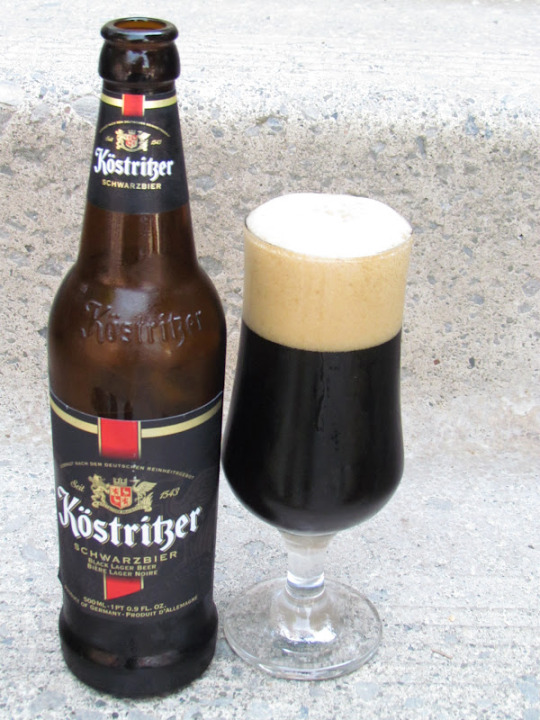
Though it's a bit harder to find, people who find Guinness (etc.) stout "too heavy" usually like it, because it's a black lager and has the dark bitterness of stout without the "weight".
Green beer, on the other hand...
Well, there's a legitimate version, though it's not Irish. Meet Berliner Weissbier mit Waldmeistersirop, Berlin wheat beer with woodruff syrup:

Berlin Weissbier without syrup is a golden beer, and quite sour, hence the traditional addition of Waldmeister (woodruff) or Himbeer (strawberry); straws and wide goblets or squat tumblers are also traditional:
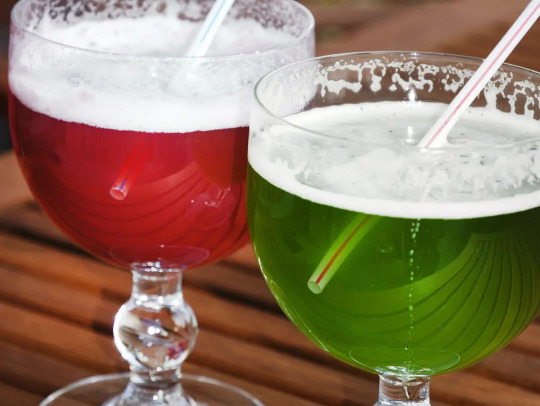
When @dduane and I were at a convention in Germany, we were told (true or not?) that people who didn't mind the sourness of the un-syruped beer sometimes drank "Ampeln" - traffic lights - during an evening out.

I've yet to get to Berlin, and Bavarian Weizenbier is a completely different creature to Berliner Weisse, but the city, the beer and a bunch of other things are all on my bucket list.
As for green beer in Ireland, time was I'd have said you'd never see it here even at St Patrick's, but time was, time is, times change, and tourists want Stuff.
That's probably why, when I was ambling past a pub in Dame Lane a few years ago, I saw a sign.
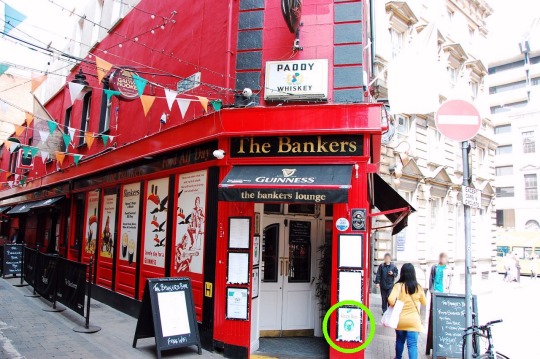
And when I got closer, the sign did indeed say what I thought it said.

So I went straight into the pub, sat down at the bar, took a deep breath...
...And ordered a Guinness.
:->
#beer#berliner weisse#dude i should try berliner weisse with strawberry though#you gave me a great idea here
91 notes
·
View notes
Text
how cute is this beer i got as a silly little treat?? look at ittttt

#it's a carrot cake flavoured berliner weisse#called eostres morötter#it tastes pretty much how it sounds like
6 notes
·
View notes
Photo
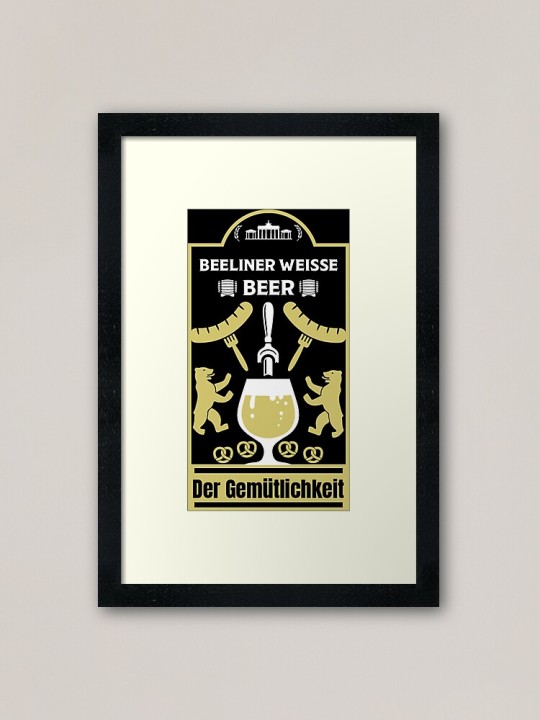



(via German Berliner Weisse Beer Framed Art Print by bestawesome)
0 notes
Text

vom Paul-Lincke-Ufer 10999 Berlin
15 notes
·
View notes
Text
a really poor attempt on replicating rollis famile photos style

#I would do rolli but my ahh is tired#rolliundrita#rolli und rita#halloausberlin#hallo aus berlin#rita weiss#rita weiß#was ist dein lieblingsfach#drawing#rolli schmidt#rita hallo aus berlin
13 notes
·
View notes
